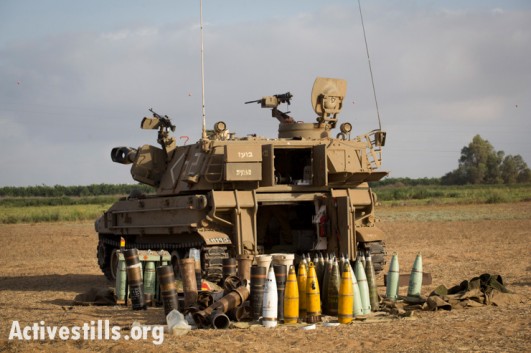As Israel and the Palestinians descend further into open violence, concerned Israelis challenge their fellow citizens in an attempt to forge a joint Israel-Palestinian resistance to violence.
(Translated from Hebrew by Idit Arad and Matan Kaminer)
Our hands shed this blood, our hands set Mohammed Abu Khdeir on fire, our hands fanned the flames. We have been living here for too long to claim that we did not know, we did not understand, we were not able to foresee. We witnessed the actions of the vast machine of incitement to racism and revenge operated by the government, the politicians, the educational system and the media. We watched Israeli society become neglected and poor, until the call to violence in all its forms became an outlet for many, fighting for their place in the margins of society, teenagers and adults alike. We saw how the meaning of being Jewish was emptied and sharply reduced to nationalism, militarism, a struggle for land, hatred of gentiles, shameful exploitation of the Holocaust and the “Teaching of the King.”
More than anything, we witnessed how the State of Israel, through its various governments, has passed racist laws, enacted discriminatory policies, labored to enshrine the occupation regime, preferring ongoing violence and victims on both sides rather than a peaceful agreement.
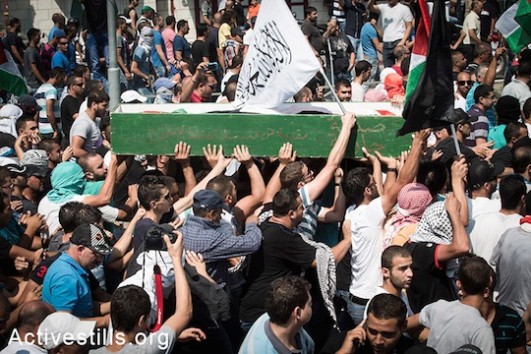
Our hands shed this blood, and we wish to express our condolences and our pain to the family of Mohammed Abu Khdeir, who are experiencing an unthinkable loss, and to the Palestinian people as a whole. We oppose the occupation policy of the government and we are against the violence, racism and incitement that exist in Israeli society. We refuse to gave our Jewishness identified with it, a Jewishness that includes the words of the rabbi of Tripoli and Aleppo, the wise Hezekiah Shabtai who said: “Love thy neighbor as thy self” (Leviticus xviii).
This love of one another does not only refer to the love of one Jew or Israeli for another, but to also loving our neighbors who are not Jews. It instructs us to co-exist with them through love, and pursue their safety and welfare. That is not only what common sense tells us, but also the holy Torah, which commands us to go about our lives in a pleasant manner, despite and in the face of the state’s actions and the words of our official representatives.
Contrary to the prohibition of murder in Judaism and Islam, our hands shed this blood. We therefore pledge to continue our struggle inside Israeli society – Jews and Palestinians together – in order to change society from within, to fight its militarization and bring forth an awareness of those who are in the minority and therefore victims of this militarization. We will fight against the choice to pursue war, the indifference to the rights and lives of Palestinians, and the continued favoring of Jews within the cycle of violence.
We shall strive to offer a human bond – a bond that is political, cultural, historical, Israeli-Palestinian and Jewish-Arab; a bond that can in part be reached through the history of many of us who are Jews of Arab origins and, as such, members of the Arab world. Our way is that of a struggle for civil equality and economic change, on behalf of the marginalized and oppressed groups in our society: Arabs, Ethiopians, Mizrahim (Jews of Arab descent), women, the religious, migrant workers, refugees and many more.
On the face of it, the stronger side in the conflict has the ability to use nonviolence to break down the racist regime and the cycle of violence. In the face of the complacency of many Israelis, we seek to lead nonviolently, while they prefer to allow the regime of injustice and the cycle of violence to remain in place, and expect “solutions” to somehow spring out of this never-ending merry-go-round of violence – its current face being the war against Gaza – thus bringing only more death and calls for revenge from both sides of the fence and pushing any sort of agreement further away.
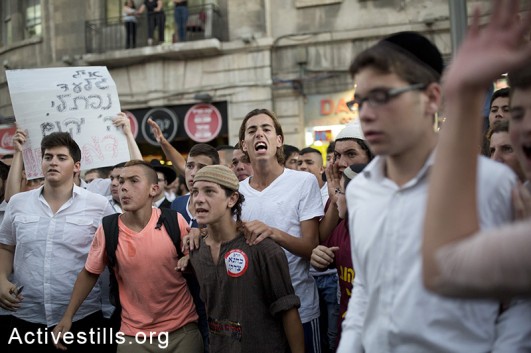
Our hands shed this blood, and our wish is to create a joint civil fight with any Palestinian group that wishes to join us in our struggle against the occupation, against the violence of the occupation regime, against the disregard of Palestinian human rights. This will be a fight for an end to the occupation, either through the establishment of an independent Palestinian state in the Palestinian territories or through the creation of a single state in which we will all be equal citizens.
Our hands shed this blood. By saying so out loud in our society we are forever accused by the nationalistic propaganda of being one-sided, of condemning only Israel’s crimes and not those committed by the Palestinians. To this we reply first and foremost: he who supports or justifies the killing of Palestinians by extension supports – and in fact encourages – the killing of Israeli Jews. In the same vein, he who supports or justifies the killing of Israeli Jews supports and encourages the killing of Palestinians. The wheel of revenge is large and fast moving, but we are against any form of violence, and seek a nonviolent solution to this violent situation.
Objecting to Netanyahu’s ways does not necessarily mean support for Hamas; the reality is not dichotomous. Other options exist on the axis between Netanyahu and Hamas. Furthermore, we must emphasize that we are Israeli citizens and the center of our lives is in Israel. Therefore, our main criticism is that of Israeli society, which we seek to repair. These murderers came from among us. There are, of course, grounds on which one can criticize other societies. Nevertheless, we think that every person’s duty is to first examine closely and critically the society in which he or she lives and only after so doing to apply this approach to other societies. If we were Palestinians we may have turned our efforts to criticism of Palestinian society, and perhaps we would have tried to create a left-wing alternative to its current regime.
We are aware of the criticism that exists within Palestinian society of its rulers. Sadly, support of such criticism by us, the citizens of the occupying state, does not always help the growth of such voices within Palestinian society. We are also aware of the lack of symmetry between the State of Israel, which is a regional military and economic occupying power, and Palestinian society, which suffers from an inward split, has no independence and which is under Israeli military control in a state of occupation.
Our hands shed that blood, and even now, when Benjamin Netanyahu wishes to express his condolences and to condemn the murder of Mohammed Abu Khdeir, he does so in the same breath, expressing a racist and dangerous claim of Israel’s moral superiority over its neighbors: “There is no place for such murderers in our society. In that we stand apart from our neighbors. In their society murderers are seen as heroes and have squares named after them. But this is not the only difference. We prosecute those who incite to hatred, whilst in the Palestinian Authority incitement is carried out by the official media and the education system, calling by large for Israel’s destruction.”
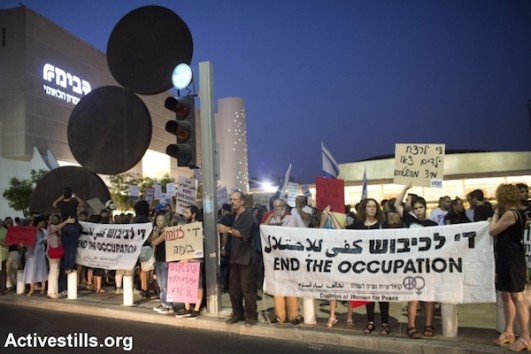
Netanyahu forgot that several individuals suspected of being war criminals served in various Israeli governments, some under his very leadership, and that the number of innocent people murdered in the last 66 years of the conflict paints a very different picture. When we look at the numbers of Jewish Israelis and Palestinians killed, we find that the number is much higher for Palestinians.
Netanyahu also forgets, or tries to make us forget, the widespread incitement propagated by his own government in recent weeks, and his own words on revenge after the discovery of the bodies of the three kidnapped Jewish teens – Gilad Shaar, Naftali Fraenkel and Eyal Yifrah – when all of us were in deep shock: “The revenge for the blood of a small child has not yet been created by the devil, nor the revenge of the blood of such young and pure boys.” There were those who interpreted the “blood revenge” in terms of an eye for an eye, and a child for a child, the logic of which would leave us all blind, orphaned and bereaved.
Our hands shed this blood, and instead of declaring days of fasting, mourning and repentance, the government has now decided to go on a military operation in Gaza, which it terms “Operation Protective Edge.” We call on the government to stop this operation at once and to strive for calm and for a peaceful agreement, something that the Israeli government has opposed in recent years. Gaza is the history of all of us; it is the oblivion of our history too. It is the most painful place in Palestine and Israel, and in its very cemetery is buried the poet Rabbi Israel Najara, who may well be chanting from the heavens words in defense of both us and the Palestinians. Gaza consists of mainly refugees displaced from the coast in 1948, and since 1967 its inhabitants have built up many of the houses that are now being bombed.
In the Israeli development towns all around Gaza lives a population of mostly Jewish refugees from the Arab world and their descendants. They were forced to leave their countries of origin after the War of Independence in 1948, in the operation poetically labeled “From the ship to the village.” As they arrived on the shores of Israel, they were transported in trucks at night directly to those development towns. They did not stop in the center of the country, lest they remain there. In the south they worked in the fields and factories of the southern kibbutzim and moshavim surrounding the development towns. Gaza has been endless wars and invasions since the war of 1948: retaliations, 1956, 1967, the invasion of Ariel Sharon in 1970 and again in 1987, 2000, 2009, 2012 and 2014.
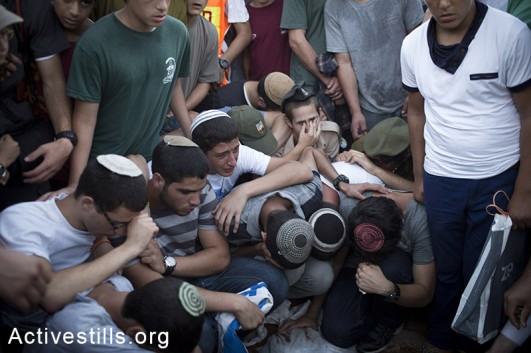
Gaza is our hopelessness. Our common origins seem to be pushed further and further away: after 40 years of possibility for a painful historic compromise between the two national movements, Palestinian and Zionist, this option is gradually evaporating. The conflict is being reinterpreted in mythological and theological terms, in terms of revenge and avenging that revenge, and all we can promise our children is many more wars for generations to come, spreading the killing amongst both peoples, and the building of an apartheid regime that will require even more decades to dismantle.
Our hands shed this blood, and we think we must examine together our common, bloody and tragic 100-year history in a global context. At the beginning of the conflict, European colonialism was at its height. It captured large parts of Asia and Africa, economically and militarily exploiting the people it occupied. It treated the occupied cultures as inferior and primitive, and massacred many, many of its subjects. Following that, many nationalistic movements, even in countries just freed from colonialism, adopted violence as a guiding principle and sought to “cleanse” their national territory of those they considered foreigners. They did so on the grounds of race, nationality, religion, ethnicity and culture, thus bringing on themselves a continuous state of war.
We seek to work against this tendency in world history. Through the various communities of our society: Jews and Palestinians, Arabs and Israelis, Mizrahi and Ashkenazi, traditional, religious, secular and orthodox. We choose to oppose the walls, separation, dispossession, deportations, racism and colonization, and to offer a joint and common future as an alternative to the present depressive, oppressive and violent state of our society. We wish to build a future that does not surrender to the cycle of violence and revenge but in its place offers justice, reparation, peace and equality; a future that draws on the common elements of our cultures, humanity and religious traditions so that our hands will no longer shed blood but will have the opportunity to reach out to one another in peace, with the help of god, Insha’Allah.
Signatories:
Orly Noy, Yossi Dahan, Inbal Jamshed, Yossi Granovsky, Eliana Almog, Eyal Sagi Bizawi, Varda Horesh, Herzl Cohen, Sivan Shtang, Yossi Vazana, Dori Manor, Yardena Hamo, Itay Kander, Avri Herling, Michal Chacham, Mirit Arbel, Yoav Moshe, Avi – Ram Zoref, Sa’ar Gershon, Yotam Kadosh, Tziki Eisenberg, Noam Gal, Amit Lavi, Sarit Ofek, Mati Shmuelof, Andre Levy, Chico Bahar, Naama Kti’i, Ronnie Karni, Tal Gilboa, Rebecca Mondlak, Arnon Levy, Noam Ben-Horin, Avtasham Barakat, Udi Aloni, Diana Danielle – Schramm, Yoram Meltzer, Rami Adot, Chamutal Guri, David China Woolf, Izzy Wolf, Yael Aharonov, Yonathan Mizrachi, Naama Sason, Idan Cohen, Zvi Ben – Dor Banit, Inbal Eshel – Chahansky, Matan Kaminer, Yotam Schwimmer, Hagit Mermelstein, Asaf Philip, Aliza Weston, Eli Bar, Dafna Hirsch, Yael Ben Yefet, Maya Spector-Behar, Erez Yosef, Yael Golan, Noa Eshel, Efrat Shani – Shitrit, Sigal Primor, Aviad Markowitz, Ilona Pinto, Tamar Novick, Dganit ElKayam – Cassuto, Alimi Sarah, Itai Snir, Diana Achdut, Liron Mor, Yoni Silver, Or Shemesh, Gal Levy, Dana Kaplan, Daniel Shoshan, Ziv Yamin, Michal Nitzan Re’ut Bendriam, Yuval Ayalon, Yuli Cohen, Oren Agmon, collected Ja’akobowicz, Jonathan Vadai, Michal Goren, Eli Oshorov, Yuval Dreyer – Shilo, Tal Shefi, Yehuda Ben-el, Moran Tal, Nurit Ben-Zvi, Eli Shmueli, Dalit Metzger, Menashe Anzi, Meir Amor, Shoshi Shamir, Eran Kalimil Misheiker, Noa Heine, Sahar Shalev, Eli Edelman, Ran Segev, Albert Swissa, Sergio Yachni, Roy Hassan, Zilla Zalt, Mazal Moyal Cohen, Abigail Eren Hozen,, Efrat Issachar, Shlomit Carmeli, Uri Ben – Dov, Tamar Mokady, Yahav Zohar, Yif’al Bistri, Yair Meyuchas, Rony Mazal, Odelia Goldratt, Idit Arad, Eldad Zion, Yotam Cohen, Noa Mazur, MIchali Bror, Or Barkat, Oz Rothbart, Esther Attar, Ronit Bachar Shachar, Adi Keysar, Ela Gringoz, Noga Eitan, Tamar Saraf, Hila Chipman, Yegev Bochshatav, Tomer lavi, Roni Henig, Vered Kupiz, Shai Shabtai, Yael Gviraz, Tamar Achiron, Gai Ayal, Hagit Bachar Morris, Amira Hass, Avraham Oz, Yael Barda, Moti Fogel, Pnina Mozpi- Haaller, Yuval Ivri, Almog Behar.
This article was first published in Hebrew on Haokets.
Related:
Let’s talk about Gaza, Sderot and the racist devaluation of lives
‘Our’ murderers – what would Arendt and Buber say?


